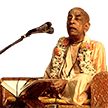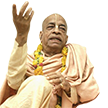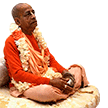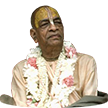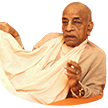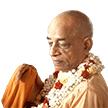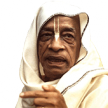Paramahamsa - an essential subject: Difference between revisions
(Created page with "Category:Essential Subjects <!----------------------- edit below this line -----------------------> <!------------------------ begin introduction text below --------------...") |
(Vanibot #0041: Moves Choose Another box to the end) |
||
| Line 2: | Line 2: | ||
<!----------------------- edit below this line -----------------------> | <!----------------------- edit below this line -----------------------> | ||
<!------------------------ begin introduction text below ------------------------> | <!------------------------ begin introduction text below ------------------------> | ||
A paramahaṁsa is one who has taken shelter of the Parabrahman, the Supreme Personality of Godhead. If one takes shelter of the paramahaṁsa spiritual master, gradually, through training and instruction, he will become detached from worldly life and ultimately return home, back to Godhead. The particular mention of aṅganāśramam asattama-yūtha-gātham is very interesting. The whole world is in the clutches of māyā, being controlled by woman. Not only is one controlled by the woman who is one's wife, but one is also controlled by so many sex literatures. That is the cause of one's being entangled in the material world. One cannot give up this abominable association through one's own effort, but if one takes shelter of a bona fide spiritual master who is a paramahaṁsa, he will gradually be elevated to the platform of spiritual life. | |||
Srila Prabhupada's books, lectures, conversations and letters offer a comprehensive presentation of this essential subject as seen in the Vaniquotes '''[[Vaniquotes:Category:Paramahamsa|Paramahamsa]]''' category. An introduction from his books is given below in the following | Srila Prabhupada's books, lectures, conversations and letters offer a comprehensive presentation of this essential subject as seen in the Vaniquotes '''[[Vaniquotes:Category:Paramahamsa|Paramahamsa]]''' category. An introduction from his books is given below in the following 8 quotes. | ||
<!-------- end introduction text and don't touch next three lines ---------> | <!-------- end introduction text and don't touch next three lines ---------> | ||
---- | ---- | ||
== Quotes from Srila Prabhupada's books == | == Quotes from Srila Prabhupada's books == | ||
<!----------------- edit quote boxes below this line -----------------> | <!----------------- edit quote boxes below this line -----------------> | ||
{{VaniQuotebox| | {{VaniQuotebox|A paramahamsa, or pure devotee, is never attracted by hatha-yoga or speculative knowledge. He is simply interested in the unalloyed devotional service of the Lord| A paramahaṁsa, or pure devotee, is never attracted by haṭha-yoga or speculative knowledge. He is simply interested in the unalloyed devotional service of the Lord. Sometimes one who was formerly addicted to these processes tries to perform devotional service and the jñāna and yoga practices at the same time, but as soon as one comes to the unalloyed stage of devotional service, he is able to give up all other methods of self-realization. '''(Śrīmad-Bhāgavatam 4.23.12)'''}} | ||
{{VaniQuotebox| | {{VaniQuotebox|A paramahamsa is one who does not live in the material world and who does not envy others|The subject matter found in Śrīmad-Bhāgavatam is meant for paramahaṁsas. As it is said, paramo nirmatsarāṇāṁ satāṁ vedyam (SB 1.1.2). A paramahaṁsa is one who does not live in the material world and who does not envy others. In Śrīmad-Bhāgavatam, devotional service is discussed to arouse the living entity to the transcendental position of jñāna (knowledge) and vairāgya (renunciation). '''(Caitanya-caritāmṛta, Madhya-līlā 19.17)'''}} | ||
{{VaniQuotebox| | {{VaniQuotebox|A paramahamsa has no program for sense gratification; he is interested only in satisfying the senses of the Lord|A paramahaṁsa has no program for sense gratification; he is interested only in satisfying the senses of the Lord. One who has control of the senses in this way is called a gosāñi or a gosvāmī, master of the senses. The senses cannot be controlled unless one is engaged in the service of the Lord; therefore the bona fide spiritual master, who has full control over his senses, engages twenty-four hours a day in the Lord's service. He can therefore be addressed as gosāñi or gosvāmī. '''(Caitanya-caritāmṛta, Madhya-līlā 9.289)'''}} | ||
{{VaniQuotebox| | {{VaniQuotebox|A paramahamsa accepts only the active principle of everything; just as a swan accepts only the milk from a mixture of water & milk, he accepts only the Supreme Personality of Godhead as his life and soul, neglecting all external, material things| An artha-vit is also called paramahaṁsa. A paramahaṁsa accepts only the active principle of everything; just as a swan accepts only the milk from a mixture of water and milk, a paramahaṁsa accepts only the Supreme Personality of Godhead as his life and soul, neglecting all external, material things. '''(Śrīmad-Bhāgavatam 4.9.28)'''}} | ||
{{VaniQuotebox| | {{VaniQuotebox|A paramahamsa accepts only the association of pure devotees and rejects others, who are too much materially addicted|A paramahaṁsa accepts only the association of pure devotees and rejects others, who are too much materially addicted. In other words, those who are materially addicted cannot understand the value of the paramahaṁsa, but those who are fortunate—who are advanced in a spiritual sense—take shelter of the paramahaṁsa and successfully complete the mission of human life. '''(Kṛṣṇa Book, Chapter 85)'''}} | ||
{{VaniQuotebox| | {{VaniQuotebox|In our disciplic line we have the example of a perfect householder paramahamsa - Srila Bhaktivinoda Thakura|In our disciplic line we have the example of a perfect householder paramahaṁsa—Śrīla Bhaktivinoda Ṭhākura. In his book Śaraṇāgati, Bhaktivinoda Ṭhākura states, ye-dina gṛhe, bhajana dekhi’, gṛhete goloka bhāya (Śaraṇāgati 31.6). Whenever a householder glorifies the Supreme Lord in his home, his activities are immediately transformed into the activities of Goloka Vṛndāvana, spiritual activities taking place in the Goloka Vṛndāvana planet of Kṛṣṇa. '''(Caitanya-caritāmṛta, Madhya-līlā 7.69)'''}} | ||
{{VaniQuotebox| | {{VaniQuotebox|The monist is not counted amongst the paramahamsas (the most perfect of the renounced order of life)|The monist is not counted amongst the paramahaṁsas (the most perfect of the renounced order of life). Śrīmad-Bhāgavatam is full of narrations of the transcendental activities of the Personality of Godhead. Although Vyāsadeva was an empowered divinity, he still felt dissatisfaction because in none of his works were the transcendental activities of the Lord properly explained. '''(Śrīmad-Bhāgavatam 1.4.32)'''}} | ||
{{VaniQuotebox| | {{VaniQuotebox|The paramahamsas are compared to royal swans who make their nests on the petals of the lotus flower. The Lord's transcendental bodily parts are always compared to the lotus flower because in the material world the lotus flower is the last word in beauty|The paramahaṁsas are compared to royal swans who make their nests on the petals of the lotus flower. The Lord's transcendental bodily parts are always compared to the lotus flower because in the material world the lotus flower is the last word in beauty. The most beautiful thing in the world is the Vedas, or Bhagavad-gītā, because therein knowledge is imparted by the Personality of Godhead Himself. The paramahaṁsa makes his nest in the lotuslike face of the Lord and always seeks shelter at His lotus feet, which are reached by the wings of Vedic wisdom. '''(Śrīmad-Bhāgavatam 3.5.41)'''}} | ||
<!----------------- edit quote boxes above this line -----------------> | <!----------------- edit quote boxes above this line -----------------> | ||
| Line 31: | Line 31: | ||
'''Paramahamsa - [[Vaniquotes:Category:Paramahamsa|explore more within this category]]'''. | '''Paramahamsa - [[Vaniquotes:Category:Paramahamsa|explore more within this category]]'''. | ||
{{EsentialSubjectTotal}} | {{EsentialSubjectTotal}} | ||
<div style="float:left;"> | |||
{{EssentialSubjectnav}} | |||
</div> | |||
__NOTOC__ | __NOTOC__ | ||
__NOEDITSECTION__ | __NOEDITSECTION__ | ||
Latest revision as of 17:05, 22 November 2020
A paramahaṁsa is one who has taken shelter of the Parabrahman, the Supreme Personality of Godhead. If one takes shelter of the paramahaṁsa spiritual master, gradually, through training and instruction, he will become detached from worldly life and ultimately return home, back to Godhead. The particular mention of aṅganāśramam asattama-yūtha-gātham is very interesting. The whole world is in the clutches of māyā, being controlled by woman. Not only is one controlled by the woman who is one's wife, but one is also controlled by so many sex literatures. That is the cause of one's being entangled in the material world. One cannot give up this abominable association through one's own effort, but if one takes shelter of a bona fide spiritual master who is a paramahaṁsa, he will gradually be elevated to the platform of spiritual life.
Srila Prabhupada's books, lectures, conversations and letters offer a comprehensive presentation of this essential subject as seen in the Vaniquotes Paramahamsa category. An introduction from his books is given below in the following 8 quotes.
Quotes from Srila Prabhupada's books
Paramahamsa - explore more within this category.
Vanipedia has now over 903 introductory articles compiled from Srila Prabhupada's books under the series titled Essential Subjects. All these articles can be seen in the Table of Content on the right side of this article and also here in this Umbrella Category. Browse through them to relish the breadth and depth of Srila Prabhupada's teachings - There is a subject for everyone.
